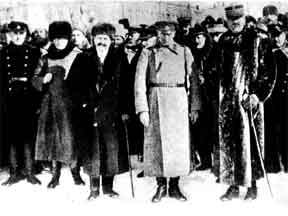History is the damndest thing, my friends.
We went to an Easter dinner at the house of the Chair of my department. There was a lady there who used to work for our department teaching Russian and French but she is now retired.
It turned out that this woman is the daughter of a White Army officer and a White Army doctor. Her parents were on the side of the people who lost the Civil War in the twenties and had to escape from Russia. They eneded up in Morocco, which is where she was born.
The weird thing is that here we were, she, a descendant of people who lost the war and I, a descendant of the people who won it.
And we both ended up in Southern Illinois, teaching at the same university.
History works in the weirdest ways.


5 comments:
you look pretty white yourself.
"In the Russian context, White connoted three designations: (i) political contra-distinction to the Reds, whose revolutionary Red Army supported the Bolsheviks and Communism; (ii) historical reference to absolute monarchy, specifically united Russia’s first Tsar, Ivan III (1462–1505), styled “Albus Rex” (“White King”); and (iii) sartorially, that some White Army soldiers wore the white uniforms of Imperial Russia."
http://en.wikipedia.org/wiki/White_movement
Yes, but 99% of the people now remember only the (1), even though the fact that the opponents of the "reds" were "white", and not "blue" for example, was the consequence of 2 and 3.
Other people get to have smart trolls but my troll from Silverdale, Washington is irredeemably stupid. :-(
Interesting. I spent a year in a language institute studying Russian many years ago. One of my teachers was a magnificent looking, tall, ramrod straight, gray-haired gentleman who had been a page to Tsar Nicholas at the age of 19, then a young officer commanding an artillery battery. Once when the Red Army was in full retreat, he turned his battery around and stopped an enemy attack, for which he received the Cross of St. George. He wore the rosette for that decoration on his suit coat lapel every day.
He went on to become a colonel in the White army, where he met and married a young sergeant in the Whites, who was also one of my teachers. They were together on the bitter frozen march through Siberia and survived to escape. They finally made it to San Francisco, heard rumors that an anti-Bolshevik movement was forming in Vienna, crossed the U.S., and went to Austria. They found it was all a rumor. So he went on to become head of an Austrian oil company, and they returned to the U.S. years later.
I heard endless stories of life in the Tsar's service, WWI, the White army and the civil war, the ordeal of the march, etc. The old gentleman and his truly lovable wife were both in their 70s when I knew them. If I ever write anything about the most interesting characters I've ever met, these two will be at the top of the list.
Post a Comment